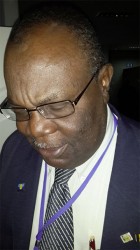Executive Director of the Caribbean Agricultural Research and Development Institute (CARDI) Dr. Arlington Chesney has announced that he will step down at the end of the year and the Board of Governors has approved the appointment of his successor Barton Clarke.
Chesney made the announcement at the closing off of the Caribbean Week of Agriculture in Suriname last week.
Clarke, who has been with CARDI for 15 years and previously with the Food and Agriculture Organisation (FAO), will inherit the cash-strapped entity. When approached by the media, the Barbadian declined to give a comment stating that at this time, it would not be appropriate as he is not heading CARDI until Chesney steps down at the end of the year.
Chesney revealed that for ten years, CARDI has dealt with the late payment of staff and outstanding issues with pension plans

are still to be worked out. He said that the 2013-2014 budget was approved at EC$700,000 and emphasised that the institute was always aware of how much money was needed to ensure that CARDI is able to carry out its mandate.
The head of CARDI noted that provisions will be put in place to facilitate the new executive director to enter into negotiations with staff. The issue of the lapsing of the membership of five members of CARDI was raised but Chesney did not identify them though he did say that during the meeting with the Board of Governors, this matter was raised.
Prior to the reconvening of the Caricom Council for Trade and Economic Development meeting which was held on Friday during the CARDI/CTA-supported Caribbean Week of Agriculture, Chesney said that the question of the deficit will be addressed, in particular, how member states may be allowed to pay over time. He said that if CARDI failed to address those debts, then future money from external sources could cease.
Chesney opined that internal sources should be the primary source of funding which would then be assisted through external resources. “We have tre-mendous reliance on external sources,” he pointed out. The CARDI head noted that when he joined the organisation seven years ago, over 90% of funding was from member states but this has dropped to 40%. During a previous interview during the CWA 2014, Chesney had stated CARDI had to work on “a reduction in the arrears to the institute, because that has an impact on the ability to attract external resources because if your parents can’t look after you, your godparents may not want to…”
He had stated that he was aware of the situation with most member states that they are not well endowed. The official said that it is imperative that a national and regional consensus is arrived at, possibly similar to some African nations that mandate that 10% or more of GDP goes into agriculture.
Chesney stated that the region simply does not put enough resources into the agriculture sector but all the while, talks about the need for agricultural development and sustainability. With that said, Chesney revealed that CARDI has access to over EC$60M for research and development.
Earlier in the week, CARICOM’s Deputy General-Secretary Manorma Soeknandan stated that the region’s agricultural entities need to find ways of complementing each other instead of competing with each other, which ultimately results in a contest for funding.
Amidst heavy criticisms from various stakeholders at the Meeting of the Alliance for Sustainable Development of Agriculture and the Rural Milieu on Wednesday in Suriname, Soeknandan said that a “real focused approach within the context of limited financial and human resources” was necessary and would allow for benchmarking of achievements. Chesney stated that CARDI has a robust promotional programme that targets both the general public and ministries. He had previously told the media that “agriculture lacks sexiness and scandal” so it does not get the level of media attention as other areas.
He said that the CARDI/CTA sponsored CWA was focused on a targeted approach in development for the future highlighting that it has grown significantly, but expansion was not necessarily the emphasis moving forward.





